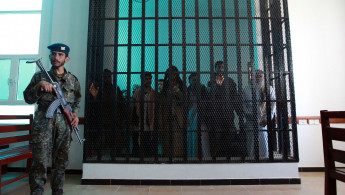The Yemeni governor caught up in an Al-Qaeda financing scandal
That dubious honour belongs to Nayif Salih Salim al-Qaysi, the former governor of al-Baydha and an alleged AQAP financier.
The Office of Foreign Assets Control (OFAC), a sub-agency of the Treasury, listed al-Qaysi as a "specially designated global terrorist" for what it described as his history of commanding and funding affiliates of AQAP in addition to acting on its behalf on May 19, 2016, six months after the Yemeni government appointed him to the governorship of al-Bayda.
Al-Qaysi denied the allegations. A little over a year later, this July, the Yemeni government sacked him without public explanation.
Tumultuous tenure
While the evidence behind the OFAC's allegations remains classified, few dispute that AQAP spread throughout al-Bayda during al-Qaysi's brief but tumultuous tenure. AQAP used the financial windfall from its control of Mukalla, one of Yemen's largest ports, to fund its expansion into the governorate.
In January, American special operations forces conducted an ill-fated raid against AQAP in al-Bayda that resulted in the death of an American soldier and dozens of Yemeni civilians.
Investigation: What really happened the night nine children were killed by US troops in Yemen?
"The Yemeni president's decision was correct and in his place, and I sent him my thanks and gratitude," al-Qaysi told The New Arab, declining to elaborate further on the reasons behind his dismissal.
 |
While the evidence behind the OFAC's allegations remains classified, few dispute that AQAP spread throughout al-Bayda during al-Qaysi's brief but tumultuous tenure |  |
"There is no known reason yet," said Mustafa al-Bidhani, al-Qaysi's former press secretary. "We haven't been able to reach the presidency to find out."
He said the former governor had tried to resign several times because the central government had failed to fund the budget for al-Bayda, pay his salary, or provide other necessities for some time.
The country's economy has collapsed as forces loyal to the Yemeni government and its Emirati and Saudi allies fight Iranian-backed Houthi rebels.
The central government, however, had reportedly asked al-Qaysi to stay to avoid the embarrassment of a resignation.
Al-Bidhani suggested the Yemeni government might have fired al-Qaysi in anticipation of him once again trying to quit, claiming the US Treasury had received its information about the former governor from the Houthis, against whom al-Qaysi had spent much of his career fighting.
UAE pressure
Olfat al-Dobai, a well-connected Yemeni professor at Taiz University, argued that it was not the US but the United Arab Emirates - one of several Arab countries backing the Yemeni government with close military support - had pressured its Yemeni proxies to fire al-Qaysi.
"It is a kind of balance in light of the current conflict and Emirati influence," she said, noting that the former governor's proximity to the Muslim Brotherhood and other Islamists concerned sheikhs in Abu Dhabi.
Emirati soldiers assisted American special forces during that fateful January raid in al-Bayda. They have also founded Emirati-led, Yemeni-staffed militias independent of the central government throughout the country, which Human Rights Watch accused of torturing alleged AQAP detainees.
The Treasury, the only American government agency to link al-Qaysi to AQAP in public, declined to comment about its role in his political demise. An OFAC spokesman said that al-Qaysi's status as a "specially designated global terrorist" remained the same, referring The New Arab to the Treasury website.
 |
The UAE, one of several Arab countries backing the Yemeni government with close military support, had pressured its Yemeni proxies to fire al-Qaysi |  |
OFAC has placed the same designation on two other Yemeni politicians: Abdulmajid al-Zindani, whom it described as one of Osama bin Laden's earliest supporters on February 24, 2004, and Abdulwahab Mohammed Abdulrahman al-Humayqani, whom it sanctioned for fundraising in Saudi Arabia on AQAP's behalf on December 18, 2013.
Both denied the allegations at the time of the Treasury's announcements but ignored The New Arab's repeated requests for comment.
Al-Dobai, the Yemeni professor, observed that al-Qaysi's replacement, Salah al-Rassas, has a close relationship with the Emiratis, who can likely shield him from American pressure if he comes to face the same difficulties as his predecessor.
Al-Bidhani, al-Qaysi's former spokesman, told The New Arab that neither he nor al-Qaysi had found a new job in a country suffering from chronic shortages and unemployment.
Now that he has so much time on his hands, maybe al-Qaysi can appeal his designation as an AQAP financier by emailing OFAC. At this point, he has nothing to lose.
He has reported from Indonesia, Iraq, Myanmar, South Sudan and Thailand, and his writing has appeared in Motherboard, The Daily Beast, USA Today, Vox, Wired, and Yahoo News.



